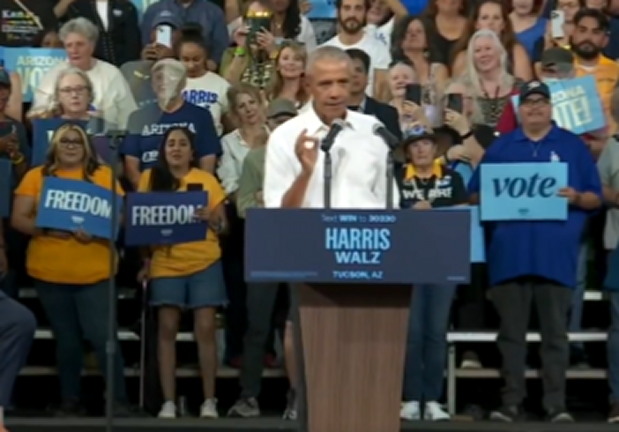Former President Barack Obama has taken to campaigning for Vice President Kamala Harris in Arizona, but his remarks have drawn skepticism and accusations of hypocrisy. Critics argue that Obama, who stood by Joe Biden during his presidency and overlooked his moments of cognitive decline, is now unfairly questioning Donald Trump’s mental fitness. This appears particularly egregious, considering media reports have highlighted Biden’s moments that could portray signs of dementia. Observers are quick to point out the double standard in how Democratic leaders perceive mental acuity in their opponents versus their own candidates.
During his campaign appearance, Obama referenced a recent town hall meeting held by Trump, where the former president reportedly swayed back and forth on stage while music played for an extended period. Obama characterized this behavior as unusual for a political leader, emphasizing that town hall meetings are intended for engaging with constituents through questions and answers. By contrasting Trump’s actions with what he claims would not be accepted from other political figures, including himself, Obama seeks to paint Trump as irresponsible and disconnected from reality. This strategy frames the narrative around Trump’s behavior as erratic, suggesting that it raises legitimate concerns about his mental state.
Moreover, Obama’s comments highlighted Trump’s self-described titles and phrases, such as calling himself “the father IVF” and labeling January 6th as “a day of love.” Obama’s incredulity over these comments served to reinforce the argument that Trump lacks the judgment and clarity expected from a leader. By invoking a relatable analogy about the concern one would feel if their grandfather acted similarly, Obama attempts to make Trump’s behavior resonate with the electorate on a personal level. This tactic encourages voters to view Trump as not just politically unfit, but as someone who might require familial concern due to his actions.
In stark contrast, Obama’s remarks have reignited discussions about the nature of cognitive decline and political accountability, especially concerning Biden. Over recent years, Biden’s public appearances have sparked debates about his mental sharpness, leading to accusations of disinformation among progressive circles who have often claimed to prioritize honesty in politics. This has led critics to emphasize the inconsistency of Democratic leadership who, while denouncing Trump’s state of mind, chose to ignore similar concerns about their own presidential candidate. These contradictions expose vulnerabilities in the Democratic messaging heading into the upcoming election cycle.
It is also notable that Obama’s efforts on the campaign trail may speak to underlying fears within the Democratic Party regarding their electoral prospects. His presence campaigning for Harris underscores a sense of urgency and concern as they grapple with a politically charged environment. Many speculate that if Obama were confident in Harris’s chances for the presidency, he would not feel the need to campaign actively on her behalf. Instead, his appearance could be indicative of Democrats’ anxiety over Trump’s potential resurgence and their own party’s stability leading into the election.
Ultimately, this situation emphasizes broader themes of political hypocrisy and the perilous nature of cognitive criticisms in a politicized landscape. As the election approaches, the rhetoric surrounding mental fitness and the implications of such judgments continue to evolve across party lines. Both sides appear to weaponize claims around cognitive health and public performance, often focusing on their opponents while refraining from addressing similar issues within their ranks. As Obama campaigns for Harris, the concerns about mental health in politics become increasingly salient, prompting reflection on where the line should be drawn regarding criticism and accountability in leadership.

